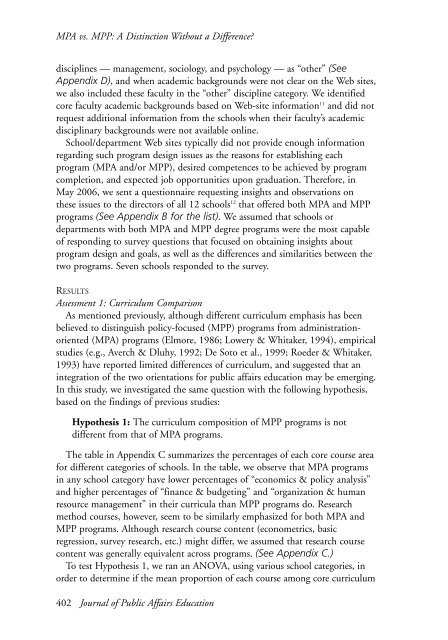JOURNAL OF PUBLIC AFFAIRS EDUCATION - National ...
JOURNAL OF PUBLIC AFFAIRS EDUCATION - National ...
JOURNAL OF PUBLIC AFFAIRS EDUCATION - National ...
You also want an ePaper? Increase the reach of your titles
YUMPU automatically turns print PDFs into web optimized ePapers that Google loves.
MPA vs. MPP: A Distinction Without a Difference?<br />
disciplines — management, sociology, and psychology — as “other” (See<br />
Appendix D), and when academic backgrounds were not clear on the Web sites,<br />
we also included these faculty in the “other” discipline category. We identified<br />
core faculty academic backgrounds based on Web-site information 11 and did not<br />
request additional information from the schools when their faculty’s academic<br />
disciplinary backgrounds were not available online.<br />
School/department Web sites typically did not provide enough information<br />
regarding such program design issues as the reasons for establishing each<br />
program (MPA and/or MPP), desired competences to be achieved by program<br />
completion, and expected job opportunities upon graduation. Therefore, in<br />
May 2006, we sent a questionnaire requesting insights and observations on<br />
these issues to the directors of all 12 schools 12 that offered both MPA and MPP<br />
programs (See Appendix B for the list). We assumed that schools or<br />
departments with both MPA and MPP degree programs were the most capable<br />
of responding to survey questions that focused on obtaining insights about<br />
program design and goals, as well as the differences and similarities between the<br />
two programs. Seven schools responded to the survey.<br />
RESULTS<br />
Assessment 1: Curriculum Comparison<br />
As mentioned previously, although different curriculum emphasis has been<br />
believed to distinguish policy-focused (MPP) programs from administrationoriented<br />
(MPA) programs (Elmore, 1986; Lowery & Whitaker, 1994), empirical<br />
studies (e.g., Averch & Dluhy, 1992; De Soto et al., 1999; Roeder & Whitaker,<br />
1993) have reported limited differences of curriculum, and suggested that an<br />
integration of the two orientations for public affairs education may be emerging.<br />
In this study, we investigated the same question with the following hypothesis,<br />
based on the findings of previous studies:<br />
Hypothesis 1: The curriculum composition of MPP programs is not<br />
different from that of MPA programs.<br />
The table in Appendix C summarizes the percentages of each core course area<br />
for different categories of schools. In the table, we observe that MPA programs<br />
in any school category have lower percentages of “economics & policy analysis”<br />
and higher percentages of “finance & budgeting” and “organization & human<br />
resource management” in their curricula than MPP programs do. Research<br />
method courses, however, seem to be similarly emphasized for both MPA and<br />
MPP programs. Although research course content (econometrics, basic<br />
regression, survey research, etc.) might differ, we assumed that research course<br />
content was generally equivalent across programs. (See Appendix C.)<br />
To test Hypothesis 1, we ran an ANOVA, using various school categories, in<br />
order to determine if the mean proportion of each course among core curriculum<br />
402 Journal of Public Affairs Education

















